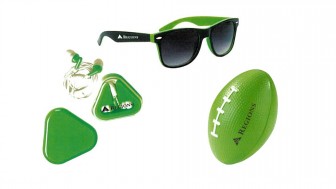Regions Bank Takes Steps To Be Autism-Friendly
Regions Bank recently announced efforts to make its 1,500 branches autism friendly.
For those living with autism, a simple trip to the store can feel like an assault on the eyes and ears. But it can be hard to imagine sensory overload in a bank lobby. These places are often viewed as quiet, usually dull places.
“You’re right. Banks are quiet,” says Tracy Cron. “But our children are often not quiet.”
Tracy Cron’s son, Remy, has autism. Autism makes processing sights and sounds difficult, to the point where something as mundane as the beeping of an ATM machine can be physically painful. When Remy was younger, Tracy says she would feel judged when her son had tantrums in public.
“It was very difficult for me to try and control his behavior and also try to work with the employee behind the counter,” she says.
Justin Schwartz, a behavioral pediatrician at UAB, says the way those with autism react to different triggers is often misunderstood. “It can be very disruptive, and for those who don’t understand what’s going on it can be off-putting or put the individual at risk of stigmatization or other things,” he says.
He adds this feeling of being judged can cause families to isolate themselves. “For a lot of families that makes them avoid a lot of places because they don’t want to feel that,” he says.
That’s part of the reason Schwartz worked with Regions on a plan to make its branches autism-friendly. Along with employee training, each branch will have a designated quiet area and sensory bags with items meant to help those feeling overwhelmed. There’s a green stress ball and earbuds to help block out sound.
Lots of businesses across the country are taking measures to be autism-friendly. That includes places much louder than banks, like sports arenas.
About a year ago, the Cleveland Cavaliers were hosting, ironically enough, an Autism Awareness night when security at the arena wouldn’t allow a boy with non-verbal autism to enter the arena with his iPad. He needed the iPad to communicate.
Shortly after that, the Cavaliers began working with KultureCity, a nonprofit focused on accessibility for those with autism. KultureCity trained the arena’s staff and provided sensory bags. They also helped design a sensory room — a quiet escape from the game’s chaotic atmosphere.
KultureCity’s founder, Julian Maha, says there’s another incentive for businesses: it makes money. He says that’s already happened for the Cavaliers. “They’ve actually picked up about 52 new season ticket holders for next season who are requesting sensory inclusive kits,” says Maha.
Maha says Regions is taking a good first step, but he disagrees with some choices — particularly the earbuds. He says for people with autism putting something inside the ear can be painful. “If you’ve designated it as autism-friendly, that’s something you would never ever use,” he says.
UAB’s Justin Schwartz disagrees. “Nothing in the world of autism is an absolute,” he says.
Autism Speaks, an autism advocacy group, is unaware of any clinical research that would rule out earbuds.
One things Schwartz and Maha do agree on is while the bags and quiet rooms are important, training employees to understand autism is essential. “So it’s not a mystery,” says Schwartz. “So it’s readily understandable. And with that understanding what we hope is there’s great acceptance.”
And that’s what Tracy Cron wants for her son from businesses. Acceptance. “That we will not be judged because we act differently,” says Cron.
And getting businesses to help strip away that stigma is an important step for helping those living with autism.
Pentagon puts Scouts ‘on notice’ over DEI and girl-centered policies
After threatening to sever ties with the organization formerly known as the Boy Scouts, Defense Secretary Hegseth announced a 6-month reprieve
President Trump bans Anthropic from use in government systems
Trump called the AI lab a "RADICAL LEFT, WOKE COMPANY" in a social media post. The Pentagon also ordered all military contractors to stop doing business with Anthropic.
HUD proposes time limits and work requirements for rental aid
The rule would allow housing agencies and landlords to impose such requirements "to encourage self-sufficiency." Critics say most who can work already do, but their wages are low.
Paramount and Warner Bros’ deal is about merging studios, and a whole lot more
The nearly $111 billion marriage would unite Paramount and Warner film studios, streamers and television properties — including CNN — under the control of the wealthy Ellison family.
A new film follows Paul McCartney’s 2nd act after The Beatles’ breakup
While previous documentaries captured the frenzy of Beatlemania, Man on the Run focuses on McCartney in the years between the band's breakup and John Lennon's death.
An aspiring dancer. A wealthy benefactor. And ‘Dreams’ turned to nightmare
A new psychological drama from Mexican filmmaker Michel Franco centers on the torrid affair between a wealthy San Francisco philanthropist and an undocumented immigrant who aspires to be a dancer.







